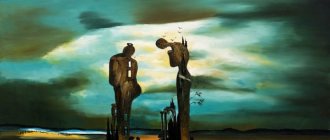The world-famous English writer Agatha Christie once remarked:
This is a strange world, where two people look at the same thing, but see the complete opposite.
Agatha Christie
It is amazing that all of us, so different, so special and individual, can get along in the same world, live in at least partial mutual understanding. But why are we so different? In fact, worldview plays a huge role in our lives. How is it formed? What does it represent? We will try to answer these and other questions further.
What is attitude
Worldview, attitude is a person’s idea of the world that surrounds him. This is a system of beliefs, faith in a certain image of the world based on views, ideas, assessments, experiences, principles. Organized, purposeful human activity is formed on the basis of the worldview.
Attitude is the emotional and psychological basis of a worldview, awareness, during which information is transformed and two types of perception are formed:
- ordinary - a person gains an opinion about the preferred lifestyle, others, family, work, etc.;
- theoretical - knowledge of oneself and the meaning of life according to scientific and philosophical data.
Worldview is the unification of all levels of perception of reality into one system of values, knowledge, emotional reactions and life position, which is confirmed practically.
What is a person's worldview?
That is, the carrier of a worldview can be either an individual (you, me) or society as a whole. In the latter case, this is called the mentality inherent in a particular society.
The structure of the worldview is as follows:
- Attitude is the emotions you experience. Your mood and feelings in different circumstances and among different people.
- Worldview is your overall vision of the world and attitude towards it.
- Worldview is your system of views (and ideas) about the world as a whole. It is built on a rational-theoretical level of consciousness.
- Attitude is a set of your values (attitudes on certain life issues). It is formed on the basis of the first and third points of this structure.
- Mentality is everything taken together attributed to one ethnic group, nation, group of people (society). It is formed on the basis of common historical, cultural and economic development experience.
How it is formed
Each person is born in a specific country, family, body. A huge contribution to his worldview is made by his parents and other significant people: teachers, relatives, peers. Thus, the worldview begins to form from the first day of birth.
If mom and dad love, care for and cherish the baby, he recognizes the world as warm and caring, and feels the importance of being in it. Cruel or distant adults teach the child to feel unnecessary, superfluous, and the world - full of dangers.
In the process of upbringing, training and socialization (what is this?), the individual acquires knowledge of what reality is. Initially, each of us is a blank sheet on which a certain picture gradually emerges - a subjective picture of the world.
Hierarchical structure of worldview
Humanity continually accumulates knowledge, creating culture. Starting from childhood, a person forms an idea of the world under the influence of personal characteristics of perception, including upbringing, temperament, intelligence, local mentality, etc.
Worldview is a hierarchical structure of a person’s beliefs, consisting of many levels. At each step of this pyramid, beliefs have a relatively greater or lesser degree of confidence in a person. They can be presented in the form of a diagram, which is based on facts verified by personal experience; at a higher and less “solid” level there will be facts from the lives of familiar people, and the very top will be occupied only by theory, assumptions about the unknown sphere of the world.
Is attitude an uncontrolled mechanism or an acquired layer of human consciousness?
Considering all of the above, a logical question arises: “Is it possible to change your perception or is it unchanged?” Initially, many philosophers believed that the worldview is an innate gift of a person that appears at birth. Therefore it cannot be changed.
However, over the years, philosophy grew stronger and was supplemented by the works of scientists studying not only the Western school, but also the Eastern one. And their views differed from those stated earlier. A direct confirmation of this is the spiritual practice of Buddhist monks, which can radically change a person’s perception of the world.
Belief Levels
The basis of ideas about the world has the most ancient roots, contains the most necessary information for life and is confirmed by the knowledge of people of other eras. Basic-level beliefs were formed as a result of personal knowledge of the world, so they are the most durable. The senses are the most reliable indicators that are not questioned.
The next level of worldview and understanding of the world is based on information coming from society. The useful function of this type of belief is that people are able to enrich each other's worldview and use their time rationally for self-development, without spending it on what has been explored by others. But if the information conveyed contradicts fundamental confirmed knowledge, it cannot be placed at the base of the belief pyramid. And the data gleaned in this way takes its appropriate place, in this case, relatively closer to the theory.
At the highest level of worldview are essentially theoretical beliefs. They are more complex because they are based on information from previous levels. Creating a theory requires the observation and debate of generations combined with the mind of a genius. It is thanks to mastery of a theoretical worldview that an annual increase in human life expectancy, as well as the development of high technologies, is possible.
It should be said that the highest level of belief is the most disordered. There are many unproven theories, prejudices, erroneous hypotheses, and superstitions that penetrate the consciousness due to a lack of knowledge and become features of the worldview. Evaluations complement this type of belief. Man himself paints subjective reality in the colors he wants to see.
Types and types of worldview
The classical classification of worldview comes down to distinguishing two types of worldview: ordinary and scientific.
The everyday worldview is spontaneous in nature, that is, it is formed unconsciously, through the usual perception of information, drawing up simple practical conclusions, assessing other people’s opinions and judgments, and daily practice. The everyday worldview is formed continuously and is supplemented with information with its subsequent assessment every moment.
The scientific worldview presupposes the work of thinking, the connection of the analytical apparatus, and the formation of judgments based on proven information. Here we already have to face some problematic situations, contradictions and try to understand them.
The division of worldview into types with the indicated names is quite arbitrary, because, in principle, a person working in the field of science can operate to a greater extent with an ordinary worldview, that is, rely on practical arguments, without succumbing to the analysis of the events taking place in his life. At the same time, a person who has an applied nature of employment, for example, a sales consultant, a nanny or an artist, can think quite intensively, resorting to comparison, juxtaposition, study, analysis, criticism. As a rule, it is not easy to impose one’s opinion on such a person, to force her to think differently from what she would prefer at the moment.
In philosophy, there are also three types of worldviews that have been formed in the course of history:
- mythological;
- religious;
- philosophical.
The first of these types of thinking is based on myth as an attempt to explain surrounding phenomena. Mythology arose in primitive society, and people, through images of similar gods, animals and other characters, tried to explain what they drew from the surrounding reality. Why did they do this? The only thing that prompted them to do this was fear. Today, mythology is also part of culture, and therefore part of society. But why is it needed today?
People have always tended to “finish out” those situations and circumstances that raised doubts, to “find out” what is difficult to explain. The mythological episode form is a great way to do this by incorporating an element of fantasy or interweaving seemingly unrelated ideas. In general, a myth is a reflection of life cases with their embellishment and final meaningful design.
The religious worldview arose with the formation of class society, when the need arose to find a force that would promote the unity of society and the search for a compromise between elementary social groups. It is no coincidence that the verb religare (Latin) is translated as “to reunite.”
The religious worldview differed from the mythological one in that it was more progressive in nature due to the endowment of a person with a large amount of freedom, which seemed to be limited by divine forces. However, man was endowed with freedom of choice and will, which seriously allowed him to rise above external circumstances. We can say that human fear has taken on a slightly different form.
The religious worldview still influences the psychology of the individual today. Statistical forecasts indicate an increase in the number of believers, especially Muslims, who by 2050 will make up about 30% of the population (today only 23% of the world's population). Therefore, if you thought that religion in our time is fading into the background, do not rush to conclusions.
And the last type of worldview is philosophical. The most developed, progressive form of worldview, which assumes the ability to use one’s analytical potential, thinking, and formulate one’s point of view, regardless of the opinions of other people. The philosophical type of worldview does not necessarily involve the study of some philosophical materials or specialized literature. This is just an opportunity to treat any material in the described way.
Knowing the types of worldview, we can now trace how human consciousness has changed historically, and what remnants of the past can remain in our consciousness to this day. For example, fear of external circumstances, the creation of fictitious images that facilitate real patterns of behavior, reluctance to fight and look for a way out of the situation using real methods and opportunities are typical traits that we inherited from the mythological worldview.
Religion, you need to realize, was originally based on the reunification of people, their reconciliation and connection with the surrounding, sometimes cruel world through God as a supernatural force, and also served as a restrictive tool in regulating the behavior of people in society.
A philosophical worldview in its pure form presupposes getting rid of stereotypes imposed both by historical forms of worldview and by modern society. Therefore, the ability to analyze events around and rely on the arguments of reason are features of a philosophical worldview.
To make the process of forming a worldview easier and more interesting, we suggest you start by getting to know yourself. Our online Self-Discovery program in 4 weeks will help you find out what you really want in life, what your strengths and points for development are.
The modern world largely requires clarity and confidence from us, while not giving it in external circumstances. Let's look at why one should have a concrete understanding and perception of the world.
Development of worldview
Established thinking protects against inappropriate actions, but at the same time it does not allow you to look at life from a different angle. View provides mental stability, without which a person feels insecure, unprotected, and like a hermit.
Adequacy of thinking is the most valuable thing a person has, but it is more common for people to adhere to their illusions rather than care about the “purity of their brains.”
Worldview is not capable of developing without sufficient interest in objective reality, including the manifestation of mental processes - self-awareness. The effectiveness and integrity of the worldview will depend on the degree of versatility of interests, for which narrowly focused mystical and paranormal ideas, unconfirmed by experience, and conditioned states of dependence are undesirable.
A particular direction is well practiced using a well-established scientific method. Information should be questioned and verified by personal experience, and not taken by faith.
Worldview is associated with curiosity, the ability to be surprised, a sense of unity with nature, involvement in history, reverence, admiration and other facets of human consciousness.









